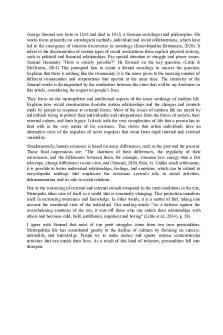HIST1421 - Learning Journal Unit 1 PDF

| Title | HIST1421 - Learning Journal Unit 1 |
|---|---|
| Course | History Greek & Roman Civilization |
| Institution | University of the People |
| Pages | 2 |
| File Size | 75.5 KB |
| File Type | |
| Total Downloads | 10 |
| Total Views | 137 |
Summary
HIST 1421 - History Greek & Roman Civilization - Learning Journal Unit 1...
Description
The Athenian democracy, developed around the fifth century B.C.E, was the first democracy in the world and, at the same time, ancient Greece's most developed type of democracy. Some traditional polis values were completely affirmed with the creation of democracy, while other ideas were enforced for the first time. The egalitarian goal of equitable treatment of all people before the law was eventually realized, as democracy is a system of governance in which power (kràtos) is in the hands of the people (dèmos). Citizens' power was no longer unequally allocated, but rather flowed from one to the other: command and obedience were no longer static contrasts between people, but rather parts of a dynamic and reversible relationship. In a circularity of functions that encompasses the whole population, a citizen now obeys, but tomorrow commands, and then returns to obey. According to Blackwell (2003), the collapse of democracy was a long and winding road, punctuated by a few spectacular events and a series of misfortunes. In particular, Macedonia's rise to power in the Greek world, first under Philip and then under his son Alexander, played a significant role at the end of democracy. Everything started in 338 BCE, when Philip's army defeated the united armies of Athens and Thebes in the Battle of Chaeronea, prompting Athens to join the League of Corinth, an organization that actually gave Philip full control on Greek affairs. In 336 BCE, after Philip’s death, all of Greece fell under the rule of King Alexander the Great of Macedon, which assumed command of the League and used it to invade Asia and start a war with the Persian Empire. The Macedonians never used force against the Athenians during Alexander's lifetime, although this was only because the Athenians did not publicly act against Macedonian interests. Things started to change in 323 BCE, when news of Alexander's death reached Greece, as the Athenians retaliated against anybody who spoke out in favor of collaborating with Macedonia. At the end of the year, Leosthenes led Athenian and allied forces against the Macedonian forces led by Antipater. The assault seemed to be successful, but eventually, Leosthenes was killed while besieging the stronghold of Lamia, Macedonian troops came in the spring of 322 BCE, and Athens was defeated. Unexpectedly, the Macedonian Antipater enforced a settlement on Athens, limiting settlement to
wealthy citizens, a thing that marked the end of the city's autonomy and created a chasm between the rich and the poor, resulting in the downfall of democracy. Since then, for about 2000 years, a succession of foreign monarchs and emperors dominated the cradle of democracy: the Macedonians, Romans, Byzantines, and Ottoman Turks. Only in 1975, five years after it gained independence as a modern nation not governed by foreigners, Greece became a democracy again, setting Athens as capital (Brand, n.d.). Word Count: 470 References Blackwell C. W. (February 28, 2003). Athenian Democracy: a brief overview. Retrieved From https://www.stoa.org/demos/article_democracy_overview@page=10&greekEncoding=UnicodeC.ht ml Brand, P. J. (n.d.). Athens & Sparta: Democracy vs. dictatorship. Retrieved from https://my.uopeople.edu/mod/book/view.php?id=261554&chapterid=299246...
Similar Free PDFs

Learning Journal Unit 1
- 2 Pages

Learning journal unit 1 2203
- 3 Pages

Learning Journal Unit 7 1
- 4 Pages

Learning journal unit 1 CS1001
- 3 Pages

Learning journal unit 4
- 3 Pages

Learning Journal Unit 8
- 2 Pages

Learning Journal Unit 3
- 2 Pages

Learning journal unit 3
- 2 Pages

Learning Journal unit 7
- 2 Pages

Learning Journal Unit 8
- 2 Pages

Learning Journal Unit 6
- 1 Pages

UNIT 3 Learning Journal
- 2 Pages

Learning Journal Unit 2
- 2 Pages

Learning Journal. Unit 6
- 3 Pages
Popular Institutions
- Tinajero National High School - Annex
- Politeknik Caltex Riau
- Yokohama City University
- SGT University
- University of Al-Qadisiyah
- Divine Word College of Vigan
- Techniek College Rotterdam
- Universidade de Santiago
- Universiti Teknologi MARA Cawangan Johor Kampus Pasir Gudang
- Poltekkes Kemenkes Yogyakarta
- Baguio City National High School
- Colegio san marcos
- preparatoria uno
- Centro de Bachillerato Tecnológico Industrial y de Servicios No. 107
- Dalian Maritime University
- Quang Trung Secondary School
- Colegio Tecnológico en Informática
- Corporación Regional de Educación Superior
- Grupo CEDVA
- Dar Al Uloom University
- Centro de Estudios Preuniversitarios de la Universidad Nacional de Ingeniería
- 上智大学
- Aakash International School, Nuna Majara
- San Felipe Neri Catholic School
- Kang Chiao International School - New Taipei City
- Misamis Occidental National High School
- Institución Educativa Escuela Normal Juan Ladrilleros
- Kolehiyo ng Pantukan
- Batanes State College
- Instituto Continental
- Sekolah Menengah Kejuruan Kesehatan Kaltara (Tarakan)
- Colegio de La Inmaculada Concepcion - Cebu

